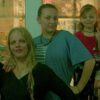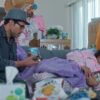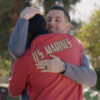“I want to be alone so no one hears me,” Mediha Ibrahim Alhamad says early on in the film that’s named after her, having the camera as seemingly her only confidant after her family has been forced out of their village in Sinjar in Northern Iraq when ISIS overtook it. As Yazidis, they’ve been branded devil worshippers by extremists in the region when the community developed their own religion over generations, living on the border between Iraq, Turkey and Syria and can’t be easily associated with either Christians or Muslims, putting them at great risk when they’ve been seen as an other. Mediha can feel that way in her own family when she only has her two younger brothers Ghazwan and Adnan left after her parents are thought to have perished, having to essentially take care of them as a mother would when she is just 15 and living in a refugee camp where her natural instincts as a teen would tell her to leave even if the physical confinement itself didn’t seem stifling.
Mediha may have to keep quiet when danger is all around her, but freedom arrives in some respect when she gets her hands on a camera, able to share her experience with someone and given a ray of hope that another of her brothers — Barzhan — is still alive and can potentially be reunited with her after Barzhad, an investigator, has come to believe he was sold off as an orphan to a family in Turkey. It may come as a small comfort, but in offering a rare view of what the oppressed community has experienced in the past decade as ISIS has systematically decimated them, particularly targeting women, Mediha has done something extraordinary in her collaboration with director Hasan Oswald, who provided the camera to her to chronicle her own experience and after observing a different kind of perilous journey in his debut “Higher Love,” following a couple in New Jersey attempting to drive out the third wheel in their relationship when one had a crippling meth addiction, Oswald sees the young woman come into her own, not only finding the strength within herself to hold what she has left of her family together, but moving past the trauma of being held captive by ISIS when she was 10.
True to its title, “Mediha” may limit itself to one person’s experience, but it reveals a network of people attempting to help her, even if she can’t be aware of it as Barzhad, whose offices are filled with binders of information he’s collected about the 3000 missing Yazidis he’s set about trying to find, and physicians take great risks to volunteer their time and energy to providing treatment to people living in the camps, having to show great sensitivity to their psychological conditions while tending to them physically. That network would now seem to grow as audiences able to bear witness to Mediha’s plight, with the film earning a Grand Jury Prize upon its premiere last year at DOC NYC and taking similar honors at the Florida Film Fest and BendFilm as it’s continued to play on the festival circuit this year and Emma Thompson joined the production as an executive producer. As the film now makes its way into theaters across the country, Oswald spoke about how he was able to facilitate such a complicated production, building a relationship with Mediha and the Yazidi community at large and watching her grow up in front – and behind – the camera.
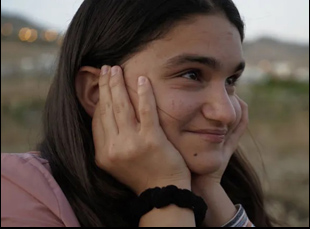
I was in the region, filming a different movie at the time and my translator Amal was Yazidi, so she was my intro into their culture, their religion and their people. After we were done filming, Amal would take me to her family and friends for tea and dinner, and that’s how I learned about these amazing people with a tortured past. I shelved it away as a story I’d like to tell one day [since] I didn’t have the resources or the skill [at the time] to tell that story, but then in 2020, right after the release of “Higher Love,” COVID hit and I read an article in 2018 that said the Western world had assumed that ISIS had been defeated, but there were still at the time 3,000 Yazidis still in captivity or otherwise missing. When my first film’s festival run got canceled by COVID, I just thought, “Why not now? So I went over. And I had always been interested in rebalancing the, let’s call it, the power dynamics between filmmaker and participant. That was how I originally had the idea was to hand the lens to the participant to give them some agency back. I knew I needed someone special and who could really bear the weight of this collaboration. Of course, I found Mediha and from day one she has just been the most amazing partner a director could ask for.
Besides Mediha, you also follow Barzhad, who is tasked with trying to find her brother. Did you know from the start there were multiple storylines you could follow?
The community is very close-knit, so Barzhad knew the family and had aided in the rescue of Ghazwan, Mediha’s middle brother, and the movie was originally titled “The Missing.” It was mostly based around these rescuers and the missing Yazidi members. However, as Mediha showed her skill behind the camera very quickly and her incredible layered storytelling, it became clear that this was going to be you know 40-50 percent filmed by her while I would be embedded with the rescue team.
When we arrived, rescues were pretty much wrapping up [because of the] total lack of resources and many of these rescuers were volunteers, so when we got there and the rescuers started looking for [Mediha’s] missing brother in the film, that was not breaking news and the rescuers, and the Yazidi community as a whole, were keen to focus some semblance of a spotlight back on their cause, so they were very very welcoming. Then there was a natural, organic handing off of the narrative [on the ground] and in the edit, weaving together this thriller [of the rescue] and this quiet self-filmed footage [that Mediha had filmed of herself].
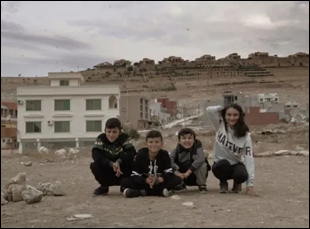
I’m not from the region, but I had spent a lot of time there and I’ve spent most of my adult life away from the U.S., so I am very comfortable in situations that other people would find uncomfortable, so it wasn’t a huge jump for me to go over to Iraq. What was really important was that when I arrived I made it clear to the Yazidi and Kurdish community that I was in it for the long haul. This was not just going to be a short, three-week shoot about the lurid details of ISIS and sexual slavery.
What was it like to put cameras in the hands of the participants, actually teaching them how to use them and see what they’d shoot?
Again, it had been something I’d wanted to experiment with, but kids that age, no matter where they are very intuitive with cameras and storytelling techniques. Keep in mind, every corner of the world has Instagram and TikTok, so they picked it up really, really quick and not to undermine the skill Mediha and her brothers have with cameras, but the cameras were 4K quality with point and shoot in a lot of situations. They did also use more complicated multi-lens cameras, but filmmaking is super accessible right now in a way that it wasn’t even 10, 15 years ago and [Mediha’s] camera cost a few hundred bucks and she could drop it or lose it and she would get another one and it had complete gimbal stabilization and all these things that really allowed the transition of me handing them the cameras to be very smooth and very quick. When we got that first [footage] back, we were blown away, not just by her storytelling abilities and what she was talking about, but also what they were getting in frame. It was pretty spectacular.
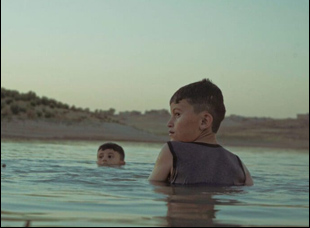
Yeah, it’s hard for a director to give up control, especially when I’m very hands-on, so I really had to let go and just send them out and see what they would come back with. I’m also not someone who overshoots — I know what I want to capture on a particular day, so to go back to my roots of filming a billion things and then mining the diamonds out of that, that’s what we did with the kids. It was uneasy at times, but the only way we could do it and at the end of the day, there was some really good footage that did make the cut. When we got that first batch of footage, I thought this footage would maybe [make for] some creative vignettes or transitions, but it immediately flipped my idea of what the narrative was going to be on its head because [Mediha] took the reins very quickly on and this film went from be called “The Missing” to “Mediha.”
One of the really poignant moments in the film is when Mediha has to cover her ears when the alarms ring out, signaling that fighting is not too far away and the film has diegetic sound but as it wears on, it’s accentuated by all the collective sounds that she must have in her head, which makes it quite cinematic. What was it like to pick those spots where you could transcend the reality of the situation to get at a truth like that?
That was a tough scene to film — I filmed that and I think it speaks to the trust that Mediha and I had already built. That wasn’t uncomfortable for either of us. She really trusted me to take care of her in that moment, cinematically and she knew that I was not going to put anything ever in the film that would make her feel bad or upset, but the first thing we did when we did the sound design for that scene and locked it was we showed her and just made sure she was comfortable with it. Now it’s one of her favorite scenes in the movie, and in this case and in a lot of cases, we just let Mediha take the lead, since this is very much her story and her POV. The ethos of do no harm was not enough for us. It was a pure collaboration from the beginning to the end, and we’ve told her everything about the edit, and [how it’s being released from] film festivals and distribution, or as much of distribution as I understand, so we are always on the same page.
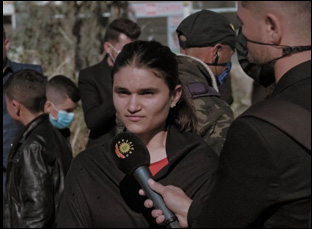
It’s been amazing. She’s been on the festival run here in the US for a while and I’d love for you to see her now. She’s become this incredible young woman who’s standing on her own and she was just finding her voice when she was given the camera and now she’s absolutely thriving. She’s going to school. We’re very, very proud of her and excited for what’s next from her, not just from the film.
“Mediha” is now open in New York at Film Forum, where Oswald and Almahad will appear after the 6:50 pm screening on October 23rd, and in Los Angeles at the Laemmle Royal. It will expand across the country on October 25th.
